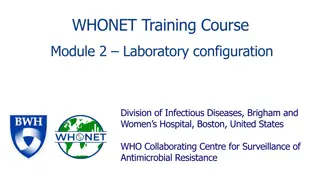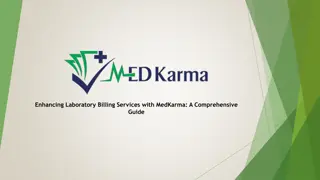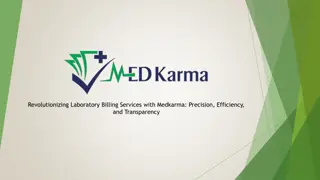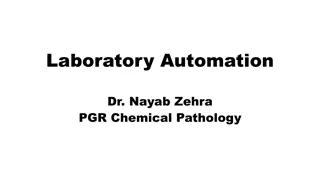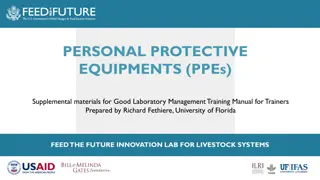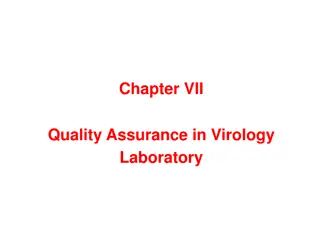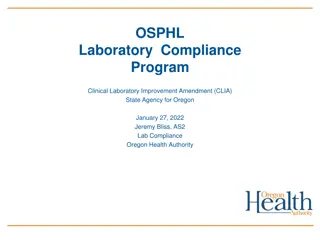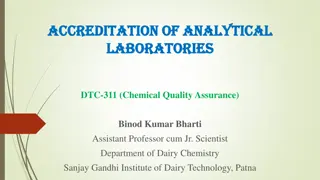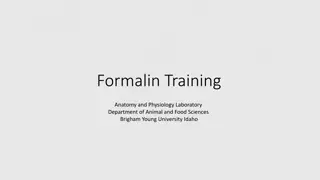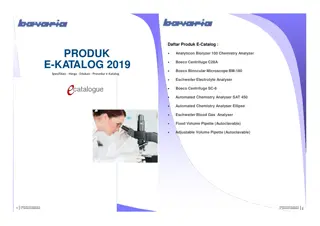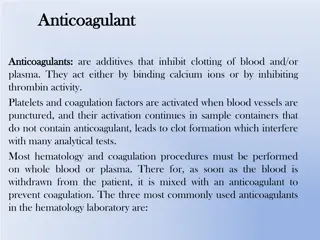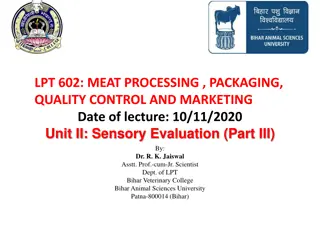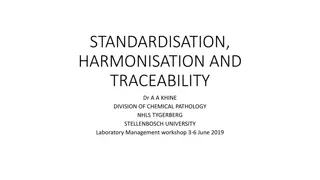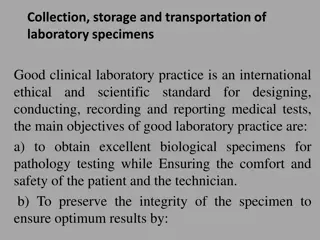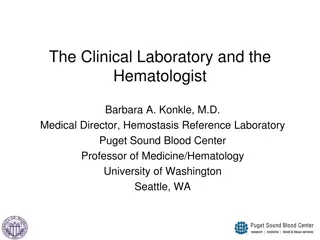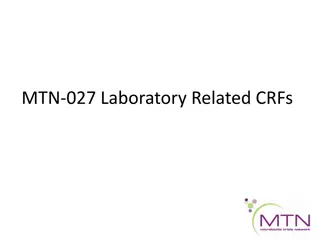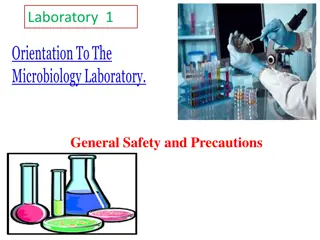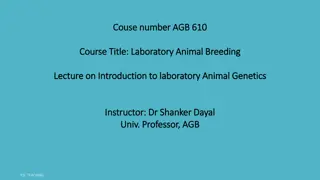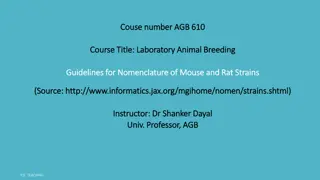History and Educational Programs of DEU Lab Animal Science Department
Established in 2004, the Department of Laboratory Animal Science at Dokuz Eylul University Institute of Health Sciences offers cutting-edge education focusing on animal welfare and ethical practices in scientific research. The department upholds the 3R Principle—Reduction, Refinement, Replacement�
0 views • 9 slides
Actions Emanating from the Evaluation of the Governance Reform
The evaluation of the governance reform within the WMO aimed to assess its alignment with strategic objectives, effectiveness in responding to societal needs, coordination efficiency, decision-making process, agility, and more. Evaluation criteria included relevance, design validity, effectiveness,
1 views • 13 slides
Laboratory Material Quality Management Procedures
This detailed guide covers the comprehensive process management and quality control procedures for laboratory materials, including the life cycle of materials, purchase processes, vendor evaluation, reception and storage guidelines, and evaluation criteria. It emphasizes the importance of documented
0 views • 20 slides
Effective Laboratory Management: Safety, Equipment Maintenance, and Inventory Control
This comprehensive training manual covers essential topics such as laboratory safety, equipment maintenance, supplies and reagents inventory, chemical inventory management, and material safety data sheets. It emphasizes the importance of proper procedures to ensure a safe working environment and eff
1 views • 19 slides
Optimizing Laboratory Billing Services, The Key to Efficient Healthcare Revenue Management
In the intricate web of healthcare management, laboratory billing services play a pivotal role. From accurately documenting procedures to ensuring compliance with complex insurance regulations, effective billing is essential for the financial health of laboratories and the overall healthcare system.
2 views • 8 slides
WHONET Training Course: Laboratory Configuration and Setup
Understanding the laboratory configuration process in WHONET is crucial for effective data entry and analysis. This module guides users on setting up a new laboratory, entering country and lab details, defining antibiotics, sample locations, and data fields, creating microbiological alerts, and savi
3 views • 57 slides
Streamlining Laboratory Billing Services, Key Benefits and Best Practices
In the fast-paced environment of medical laboratories, accurate and efficient billing processes are essential. Laboratory billing services are crucial in ensuring financial stability and compliance with healthcare regulations. This blog explores the benefits of professional laboratory billing servic
1 views • 7 slides
Enhancing Laboratory Billing Services with MedKarma, A Comprehensive Guide
In the dynamic healthcare landscape, laboratory billing services play a crucial role in ensuring smooth financial operations for medical laboratories. Effective billing practices not only streamline revenue cycles but also enhance overall operational efficiency. MedKarma, a leading provider of labor
1 views • 7 slides
Revolutionizing Laboratory Billing Services with Medkarma, Precision, Efficiency, and Transparency
In the ever-evolving healthcare landscape, laboratory billing services stand as a critical component in ensuring the financial health of diagnostic labs. The complexity of billing processes, coupled with stringent compliance requirements, demands a specialized approach. Medkarma, a leader in healthc
1 views • 7 slides
Universal Evaluation Framework: Simplifying Evaluation Processes
This session introduces the Universal Evaluation Framework (UEF) developed for evaluating QAA Scotland Enhancement Themes. Participants learn key evaluation questions, evidence capture, and the Theory of Change to enhance evaluation confidence. The QAA Scotland Evaluation Odyssey details historical
2 views • 14 slides
Implementing Blind Evaluation Pilot in HORIZON EUROPE: Key Facts and Process
HORIZON EUROPE is conducting a pilot on Blind Evaluation in the 2023-2024 work program to address biases in the research and innovation evaluation process. The pilot aims to assess the feasibility of blind evaluations in ensuring fairness and mitigating potential biases towards well-known organizati
9 views • 9 slides
Exploring Developmental Evaluation for Better Decision-Making
Delve into the realm of developmental evaluation, focusing on its purpose, principles, and application in practice. Understand how developmental evaluation emphasizes real-time data collection for informed decision-making in complex systems. Learn about key principles such as developmental purpose,
0 views • 25 slides
Laboratory Automation in Chemical Pathology: A Comprehensive Overview
Laboratory automation in chemical pathology involves the use of control systems to minimize human intervention and improve efficiency in conducting tests. The historical background, types of automation, benefits, total laboratory automation, and important considerations are discussed in detail.
1 views • 25 slides
Best Practices for Laboratory Safety and Management
Promoting a safe laboratory environment involves following safety codes and assigning responsibilities for practices like hazard awareness, equipment use, and PPE. Good laboratory practices include proper storage and handling of hazardous chemicals, with a focus on flammable, corrosive, reactive, an
3 views • 17 slides
Quality Assurance in Virology Laboratory
This chapter focuses on quality assurance in virology laboratory, covering topics such as quality control, documentation of test results, laboratory safety rules, and more. It explains the types of quality control, quality assurance cycle, and process areas of quality assurance in laboratory testing
2 views • 19 slides
Understanding CLIA: Ensuring Quality Laboratory Testing in Oregon
Describing the Clinical Laboratory Improvement Amendments (CLIA) program in Oregon, focusing on sustainable compliance for quality laboratory testing. Explains the purpose of CLIA, types of certifications, and requirements for laboratories. Highlights the role of the Oregon State Agency in administe
0 views • 13 slides
Enhancing Evaluation Capabilities in Mongolia for Agenda 2030
The Mongolian Evaluation Network in collaboration with UNDP is working to integrate the 2030 Agenda into national strategies and plans, establish institutional coordination mechanisms, align budgets, and enhance data monitoring systems. Key stakeholders including government agencies, NGOs, and inter
0 views • 9 slides
Understanding Laboratory Accreditation of Analytical Laboratories
Laboratory accreditation ensures third-party certification of testing and calibration competence, providing formal recognition to laboratories. This accreditation allows customers to identify reliable services and ensures laboratories maintain technical competence. Accreditation bodies use specific
1 views • 20 slides
Formalin Safety Guidelines in Anatomy and Physiology Laboratory
Formalin, a mixture of formaldehyde and water, is used in laboratories to preserve tissues. OSHA regulates exposure levels due to health risks. Proper ventilation and personal protective equipment are crucial to control exposure. The laboratory employs engineering controls and monitoring for safety.
0 views • 16 slides
Laboratory Equipment E-Catalog 2019
Explore the E-Catalog featuring various laboratory equipment such as the Analyticon Biolyzer 100 Chemistry Analyzer, Boeco Centrifuge C28A, and Eschweiler Blood Gas Analyzer. View specifications, prices, education materials, and procedures for these advanced laboratory tools. The catalog includes es
2 views • 7 slides
Understanding Evaluation in Education
Evaluation in education is a comprehensive term that encompasses measurement, testing, and qualitative examination of student behavior. It involves both quantitative and qualitative descriptions, along with value judgments. Differentiating from mere measurement, evaluation provides a deeper analysis
0 views • 28 slides
Understanding Anticoagulants in Laboratory Hematology
Anticoagulants are crucial additives that prevent blood clotting during laboratory procedures. The commonly used anticoagulants include EDTA, sodium citrate, and heparin, each with specific concentrations, modes of action, and color-coded identifications. EDTA is ideal for blood cell counts, sodium
0 views • 6 slides
Sensory Evaluation in Meat Processing: Panelist Selection, Training, and Sample Preparation
The lecture covers the sensory evaluation process in meat processing, focusing on the selection and training of panelists based on criteria like willingness, capability, and general health. Panelists are categorized as trained or semi-trained, with detailed guidelines for preparing and presenting me
0 views • 8 slides
Achieving Comparable Results in Laboratory Practice
Good laboratory practice necessitates minimal error in measurement to reflect a patient's biological condition accurately, ensuring comparable and reliable results regardless of testing location or method. Standardization, harmonization, and traceability play crucial roles in achieving uniformity an
0 views • 29 slides
Best Practices for Clinical Laboratory Specimen Handling
Good clinical laboratory practice emphasizes the proper collection, storage, and transportation of laboratory specimens to ensure accurate and reliable test results. Key aspects include obtaining high-quality specimens, maintaining specimen integrity, and following standard precautions to prevent co
6 views • 6 slides
Sustainable Evaluation Systems Workshop Summary
Workshop on Sustainable Evaluation Systems by Stephen Porter at the NEC Conference focused on defining evaluation systems, addressing their failures, and emphasizing the importance of quality, use, and networks in achieving sustainability. Participants engaged in activities such as bingo card introd
0 views • 38 slides
Impact and Evaluation Toolkit for Churches and Christian Charities
This toolkit aims to equip churches and Christian charities engaged in small-scale social action projects to think about impact, measure impact, choose data tools, reflect on evaluation data, and use it effectively. It covers principles of evaluation, setting objectives, selecting indicators, storyt
0 views • 34 slides
Overview of Monitoring and Evaluation in the GEF
The Evaluation in the GEF and Training Module focuses on promoting accountability and learning within the Global Environment Facility (GEF) through monitoring and evaluation activities. The GEF Independent Evaluation Office plays a crucial role in assessing results, effectiveness, and performance of
0 views • 25 slides
Insights into Hematology Laboratory Practice
This resource explores the potential role of hematologists in laboratory settings, discussing board certification, advantages, challenges, current training trends, and core curriculum lectures in hematology. It sheds light on the critical areas of laboratory training, emphasizing the importance of u
0 views • 9 slides
Laboratory Related CRFs for Pharmacokinetics Study
This collection encompasses various CRFs related to laboratory procedures in the context of Pharmacokinetics for a study. It includes forms for enrollment, specimen storage, safety laboratory results, and specific days for sample collection. The CRFs detail the storage, collection, and documentation
0 views • 14 slides
Developing an Evaluation Work Plan for Effective Program Assessment
This presentation by Amy D. Andrade from San Jose State University focuses on developing an Evaluation Work Plan to identify responsibilities and timelines. It covers topics such as Evaluation Coaching Support, Webinar Outlines, Logic Model, Inputs-Outputs-Outcomes, Two Approaches to Evaluation, Pro
0 views • 29 slides
Evaluation Synthesis in Changing Contexts: Enhancing Knowledge for Development Effectiveness
Evaluation synthesis is crucial for promoting learning, reflection, and decision-making in development work. This process involves bringing together diverse knowledge sources to generate strategic insights and facilitate wider use of evaluation findings. The Independent Office of Evaluation of IFAD
0 views • 20 slides
Evaluation of FME Zero Emission Neighbourhoods in Smart Cities
The mid-term evaluation process of FME Zero Emission Neighbourhoods in Smart Cities involves self-evaluation, partner evaluation, and panel evaluation. The procedure includes scientific review, evaluation by scholars, and innovation assessment. Key documents like self-reports, progress reports, and
1 views • 20 slides
Overview of Regular Evaluation 2017 Findings in Estonia
In the Regular Evaluation 2017, efforts were made to maximize the benefits of evaluation outcomes for various stakeholders in Estonia such as the state, society, and institutions. The evaluation focused on a range of actions including preparing legislation, finding experts, creating self-report form
0 views • 6 slides
Laboratory General Safety and Precautions
Microbiology involves the study of microorganisms such as bacteria, fungi, viruses, and parasites. It is crucial to maintain strict safety protocols in the laboratory to prevent contamination and ensure the well-being of individuals handling these potentially pathogenic organisms. Rules like wearing
0 views • 26 slides
Comprehensive Guide to Training Evaluation Methods
This detailed guide covers the aim of evaluation, evaluation methods, techniques of evaluation, types of evaluation (formative, process, outcome, impact), and the significance of formative and process evaluation in assessing training effectiveness. Learn about the key principles and practices involv
0 views • 45 slides
Laboratory Evaluation of Bite Protection from Repellent-Impregnated Clothing for the Military
The study protocol outlines a laboratory evaluation of the efficacy of etofenprox-treated military uniforms in providing bite protection against mosquitoes. The research aims to standardize the experimental approach for assessing repellent-treated textiles, particularly focusing on the performance o
0 views • 45 slides
Understanding Laboratory Animal Genetics and Research Importance
This course (AGB 610) delves into the realm of laboratory animal breeding, exploring the significance of using animals in research and teaching. Dr Shanker Dayal, a distinguished professor, guides students through lectures on animal genetics and the common uses of laboratory animals. The course emph
0 views • 14 slides
Exploring the Role and Objectives of Laboratory Teaching
The content delves into the various perspectives on laboratory teaching, its aims, pedagogical levels, and common challenges faced. It discusses specific aims of laboratory teaching, including familiarization with equipment, teaching experimental work attitudes, and training in observation and deduc
0 views • 32 slides
Guidelines for Nomenclature of Laboratory Mouse and Rat Strains
Laboratory mice and rat strains have specific nomenclature guidelines to account for their genetic backgrounds and origins. Mouse strains are registered through the Mouse Genome Database, while rat strains are registered through the Rat Genome Database. The use of Laboratory Registration Codes is cr
0 views • 14 slides





